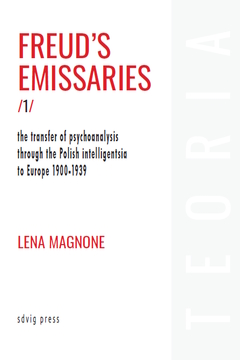1This book is an authorised translation of a work that appeared in Polish in 2016 (original title: Emisariusze Freuda: Transfer kulturowy psychoanalizy do polskich sfer inteligenckich przed drugą wojną światową). It can be read as a social history of psychoanalysis, told from the perspective of some lesser-known characters, as well as a chapter in the intellectual history of Central Europe.
2Aiming to recount how psychoanalysis reached the Polish intelligentsia in the first decades of the twentieth century, I chose to follow the life trajectories of a few Polish-Jewish disciples of Freud who played a significant role in this process: Ludwig Jekels, Helene Deutsch, Beata Rank, Eugenia Sokolnicka, Gustav Bychowski, Siegfried Bernfeld, the sisters Berta and Stephanie Bornstein, and a handful of other individuals. None of them were born in Poland – the state had disappeared from Europe’s map at the end of the eighteenth century, when, in three successive partitions, the territory of the former Polish-Lithuanian Commonwealth was divided between the Kingdom of Prussia, the Habsburg Empire and the Russian Tsarist Empire. Only one of my protagonists became a citizen of the Second Polish Republic when it was created in 1918. Some were key to the transfer of Freudian thought to other countries, such as Sweden or France. Most left Europe in the 1930s and established themselves in the United States, contributing to the postwar cultural success of psychoanalysis. It is thus a narrative of Jewish migrations and, to the same extent, a reflection on traveling concepts. I follow my protagonists in their upward social mobility and subsequent exile and uprooting. I also examine how a subversive emancipatory idea born in the turmoil of fin-de-siècle Vienna transformed into an American therapeutic method, deprived of all political scope.
3Despite the transnational dimension of this work, its focus is on the contact points between the psychoanalytical movement and Polish intellectual circles. Closely investigating the difficulties encountered in the cultural transfer of this “Jewish science”, I try to determine why it proved impossible to establish a branch of the International Psychoanalytical Association in interwar Poland and why the people most deeply involved in these efforts came to be known as American psychoanalysts. Finally, as I explore the successes and the defeats of Freud’s emissaries, I strive to provide further elements for understanding Polish-Jewish relations in a period that was essential for constructing national consciousness and modern Polish identity.
4For a few years after the book’s publication I continued my research on its central figures. Most notably, thanks to a Fulbright fellowship, I spent the academic year 2019/2020 in the United States, where I visited the archives of the New York and Boston Psychoanalytic Societies and the manuscript division of the Library of Congress. New findings were integrated into this volume, correcting some of my previous hypotheses. It was not possible, however, to fully develop what struck me the most when I confronted these unpublished personal materials, namely the impact that the war and the Holocaust had on these survivors. I reassessed this aspect in the article Freud’s Emissaries revisited, published in the Jewish History Quarterly 2022/1, where I reflect on the discrepancy between the official narrative about the American successes of Freud’s disciples and the story of trauma and alienation that emerges from the historical records.
5The final shape of this book resulted from several academic collab|orations and fruitful social encounters. I am indebted to my colleagues from the University of Warsaw, Sorbonne Université and New York Uni|versity, who offered many insights at different stages of its construction, and the Congregation Beit Simchat Torah community, which helped restore my belief in the timeliness and urgency of this project.
6I am most grateful to the Polish National Programme for the Develop|ment of the Humanities for the generous funding that made this edition possible. For their tireless work on the volume during the very dark years of the Covid-19 pandemic, I want to thank the entire editorial team but especially Tuesday Bhambry: the translator who, in the course of this adventure, also became a dear friend.




